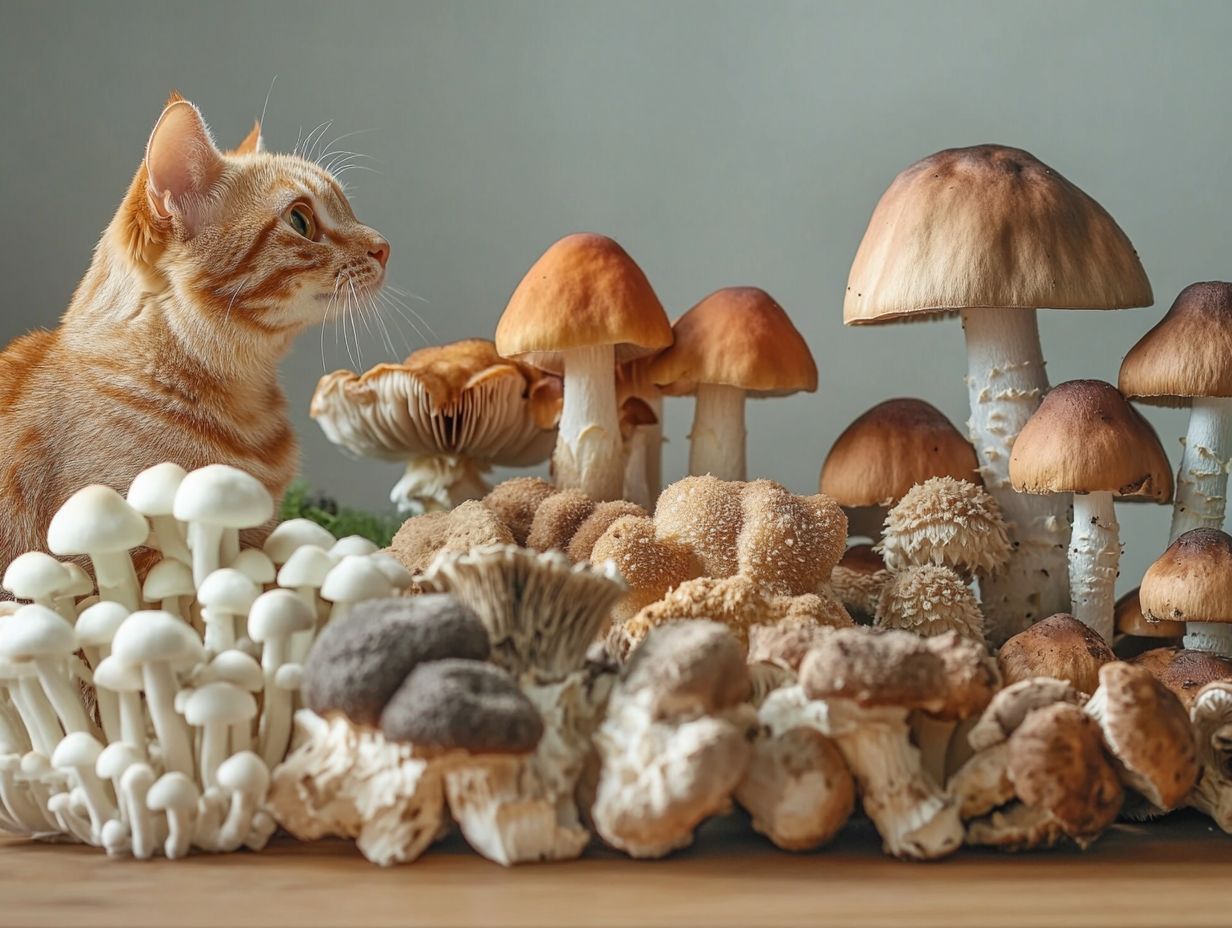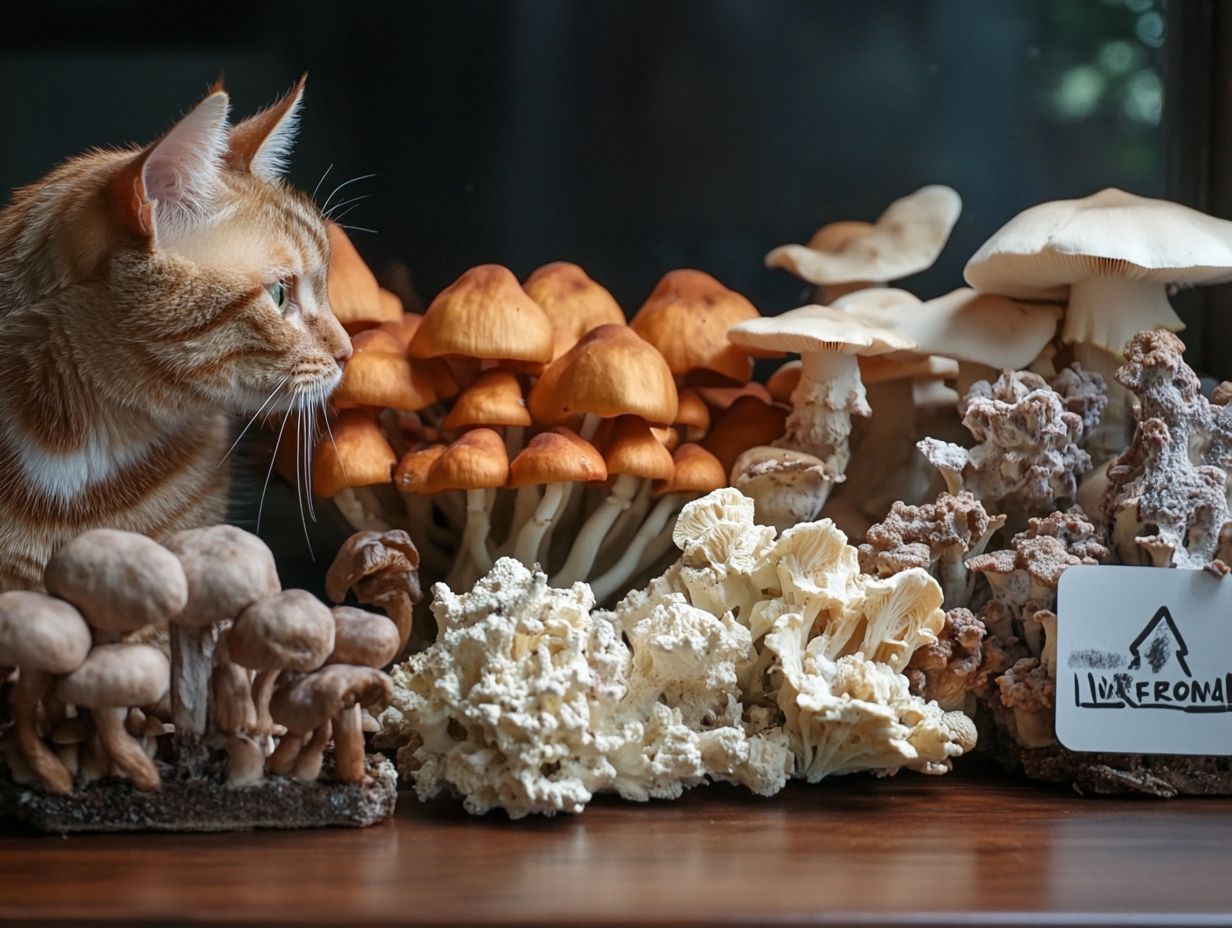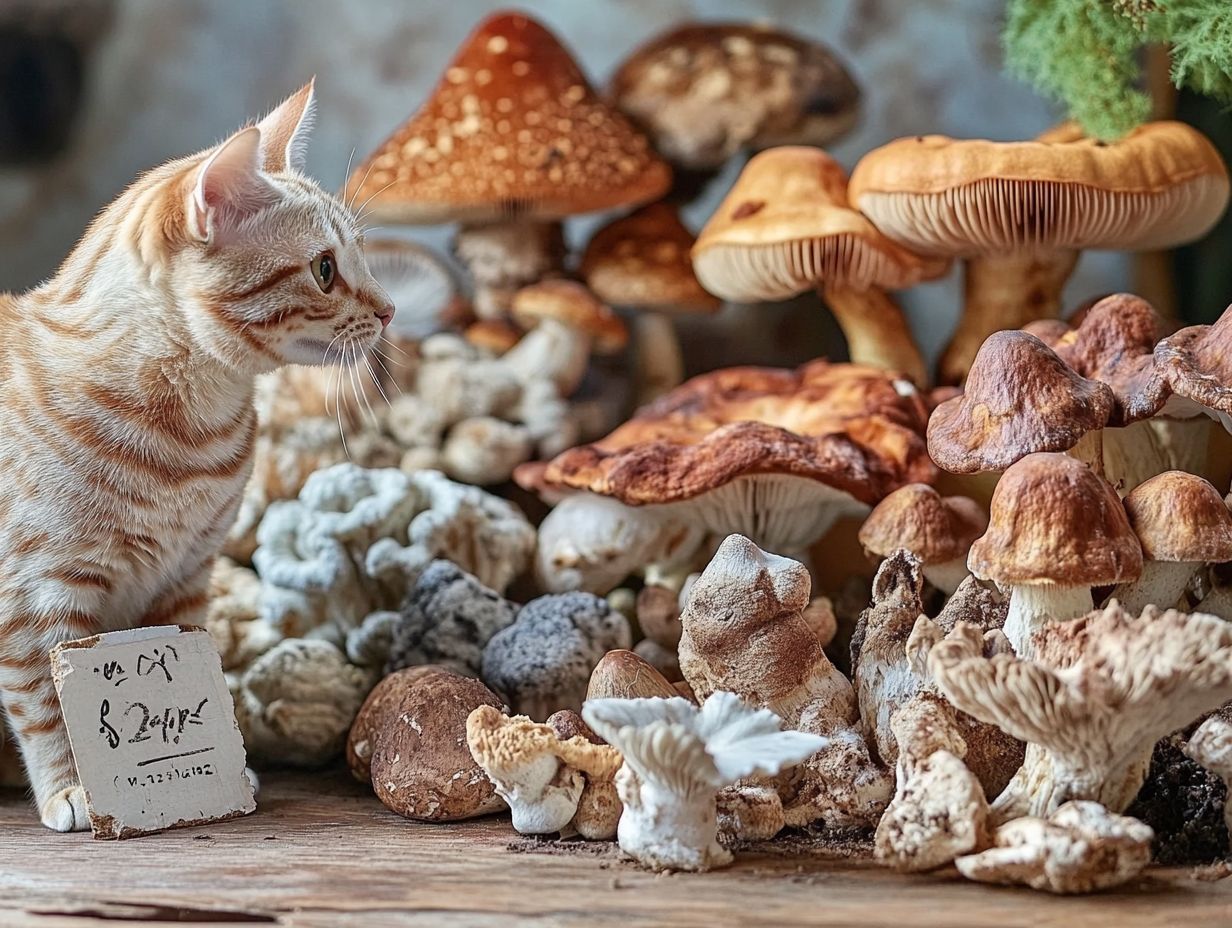While some mushrooms are safe for cats, many are toxic. Always prioritize your cat’s health by consulting your veterinarian before making any dietary changes.
This guide explains which mushrooms are safe for cats and which are toxic.
It delves into the nutritional benefits of the right mushrooms, how to introduce them gradually, and what to watch for if your cat indulges.
Additionally, it offers tasty alternatives, including healthy options and safe ingredients, to ensure your kitty gets all the essential nutrients they need.
Keep reading to find out more!
Key Takeaways:

- Some types of mushrooms are safe for cats to eat, including shiitake, oyster, and white button mushrooms, known for their umami flavor and health benefits.
- Toxic mushrooms, such as wild or foraged varieties, can cause serious health risks for cats and should be avoided.
- If introducing mushrooms into your cat’s diet, start with small amounts, monitor for any potential adverse reactions, and gradually increase the amount.
Types of Mushrooms Safe for Cats
Mushrooms that are safe for cats can be categorized into those that offer health benefits and those that may pose health risks. Shiitake and Enoki mushrooms are considered safe for cats, provided they are prepared properly. For more information, check out this article on Can Cats Eat Mushrooms? Safe Varieties vs Toxic Ones.
It is essential to cook the mushrooms by boiling or steaming without any seasoning, as other ingredients may not be safe for feline consumption. Always consult your veterinarian before introducing new foods into your cat’s diet to ensure nutritional balance.
Nutritional Benefits and Recommended Amounts
Mushrooms can provide cats with essential nutrients, including vitamin B and various proteins, contributing positively to their overall health when included in a balanced diet. They serve as a unique source of protein and can supplement conventional cat foods, particularly for those with food sensitivities or intolerances.
Incorporating safe mushrooms, such as shiitake, maitake, or reishi, can be an excellent way to enhance a cat’s diet with antioxidants that support a strong immune system. It’s advisable to keep their consumption low; adding just a few grams to their food can be beneficial. Start with 1-2 grams of cooked mushrooms mixed into regular food.
Care should be taken to introduce mushroom-based cat treats gradually. Begin with very small amounts, such as a quarter teaspoon, and monitor for signs of sensitivity or stomach upset. This gradual introduction allows for better acceptance and ensures that your cat can enjoy these healthy options without experiencing an upset stomach.
Warning: Symptoms of Mushroom Poisoning
If you suspect your cat has consumed toxic mushrooms, watch for symptoms such as vomiting, diarrhea, lethargy, and neurological issues. Immediate veterinary attention is essential.
Types of Mushrooms Toxic to Cats

Cat owners should be aware of which types of mushrooms are toxic to cats, as certain varieties, such as the Death Cap (Amanita phalloides) and Amanita muscaria, can lead to severe illness or even death.
Symptoms of mushroom poisoning may include stomach upset and neurological issues, making it essential to keep toxic mushrooms away from areas where cats are present.
Potential Health Risks and Symptoms
The potential health risks associated with mushroom consumption in cats can be severe, ranging from mild stomach upset to life-threatening conditions caused by mushroom toxicity. Signs of poisoning may include vomiting, diarrhea, and lethargy, as well as neurological effects that necessitate immediate veterinary attention.
Pet owners should be aware that symptoms of toxicity may not appear immediately. Additionally, cats experiencing mushroom toxicity may also show drooling, abdominal pain, or disorientation.
Given the uncertainty surrounding specific mushroom species and the risk of serious consequences, it is essential to consult a veterinarian at the first sign of these symptoms. Early intervention can significantly improve the chances of a positive outcome, highlighting the importance of being aware of the potential dangers that mushrooms pose in the environment.
Regardless of whether a cat displays mild or severe symptoms, contacting a veterinarian is a crucial step in addressing the potential health risks associated with mushrooms.
Can Cats Eat Mushrooms? A Guide for Pet Owners
Mushrooms can be a contentious food in a cat’s diet. While some varieties are safe, others can pose serious health risks. This article will guide you through the safe introduction of mushrooms into your cat’s diet, the alternatives available, and essential precautions.
How to Introduce Mushrooms to Your Cat’s Diet
Mushrooms should be gradually introduced into a cat’s diet, as sudden changes in food can lead to digestive issues. Cat owners should start by offering small amounts of safe, cooked mushrooms. Begin with just a quarter teaspoon of cooked mushrooms and monitor your cat for 24 hours for any signs of discomfort or stomach upset.
This approach ensures that the cat can safely digest the mushrooms and allows the owner to assess how well the cat tolerates this new addition to its diet. Always consult with your veterinarian before introducing mushrooms into your cat’s diet.
Alternatives to Mushrooms for Cats

For pet owners hesitant to feed mushrooms to their cats, there are numerous healthy food alternatives available. The primary dietary needs of cats can be satisfied with high-quality commercial cat food or homemade treats made from ingredients other than mushrooms, ensuring they receive essential animal protein.
Other Nutritious Foods for Cats
- High-quality meat sources: Chicken, turkey, and fish are excellent protein-rich options that can form the foundation of a balanced diet.
- Essential proteins: Foods rich in the amino acid taurine are particularly beneficial for a cat’s well-being.
- Safe vegetable proteins: Peas, carrots, and spinach can also be beneficial, offering valuable vitamins and fiber.
Incorporating a variety of these healthy foods into a cat’s diet contributes to their overall well-being, helping to strengthen their immune system and manage their weight. The appropriate inclusion of these protein sources and vegetables can significantly enhance their long-term health. For more information on safe foods, check out this article on whether cats can eat mushrooms.
Frequently Asked Questions
Can cats eat mushrooms?

Yes, but it depends on the variety of mushroom. Some are safe for cats to eat, while others can be toxic and even deadly.
What types of mushrooms are safe for cats to eat?
Safe varieties of mushrooms for cats include white button mushrooms, shiitake mushrooms, and oyster mushrooms. However, it’s always best to consult with your veterinarian before introducing mushrooms into your cat’s diet.
Why are some mushrooms toxic to cats?
Certain types of mushrooms contain toxins that can cause digestive upset, liver damage, or even organ failure in cats. These toxins can be fatal if left untreated.
What are the symptoms of mushroom toxicity in cats?
The symptoms of mushroom toxicity in cats can vary but may include vomiting, diarrhea, excessive drooling, lethargy, weakness, and tremors. In severe cases, cats may experience seizures or go into a coma.
What should I do if my cat eats a toxic mushroom?
If you suspect your cat has ingested a toxic mushroom, seek immediate veterinary care. Do not induce vomiting unless instructed to do so by a professional. Bring a sample of the mushroom or its remains to the veterinarian for identification.
How can I prevent my cat from eating toxic mushrooms?
Regularly check your backyard for any wild mushrooms and remove them to keep away from cats and prevent mushroom poisoning. The best way to prevent your cat from eating toxic mushrooms is to keep them away from areas where mushrooms grow, such as the yard or forest. Regularly check your yard for any new growth and remove any mushrooms that may be present. Additionally, keep a close eye on your cat while outside and discourage them from eating any unknown plants or fungi.
Conclusion
While some mushrooms can be a healthy addition to your cat’s diet, it is essential to prioritize safety and consult with a veterinarian. Always monitor your cat’s reaction to new foods and consider nutritious alternatives if you have concerns.
- Consult your veterinarian before introducing any new foods.
- Start with small amounts of safe mushrooms and monitor your cat closely.
- Be aware of toxic varieties and their symptoms to ensure your cat’s safety.